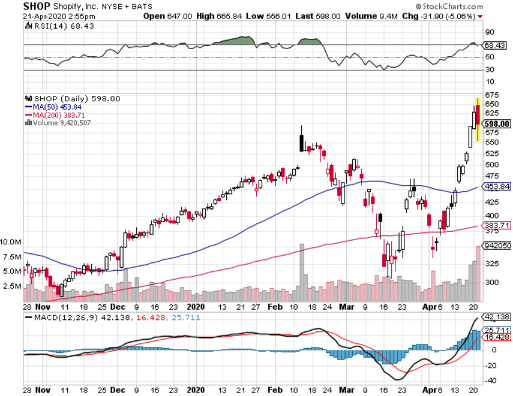Here's a Mini Amazon to Buy
This company is “handling Black Friday traffic every day” during the era of Covid-19 and it “won’t be long until traffic has doubled or more.”
Those were words right out of Shopify's CTO (Chief Technology Officer) Jean-Michel Lemieux while having one of the best seats to the biggest migration from offline to online in human history.
Investors are out there scrounging for the best coronavirus tech stocks, there never has been a time when losers lose more than ever, and winners win more than ever.
Take a look at Shopify (SHOP) if you want to associate yourself with the great coronavirus tech stocks.
The name does exactly what it sounds like and shares have almost doubled in the past 30 days to $600 per share.
In short, Shopify is a cloud-based commerce platform for small and medium-sized businesses in Canada.
Shopify was founded in 2004 by Tobias Lütke, Daniel Weinand, and Scott Lake after attempting to open Snowdevil, an online store for snowboarding equipment.
Lütke decided to do it himself after he was unable to find the right snowboarding gear online and launched it after two hasty months of development.
The platform grew wildly and was named Ottawa’s Fastest Growing Company by the Ottawa Business Journal in 2010.
Like so many other tech companies, the success was parlayed into more funding with $7 million from an initial series A round of venture capital financing in December 2010 and another Series B round raised $15 million in October 2011.
By 2014, Shopify supported 120,000 online retailers and was doubling revenue every year.
Most people don’t know this, but they have been public since 2015 and became so successful that Amazon integrated with them to allow merchants to sell on Amazon from their Shopify stores.
The stock exploded 10% on this news and they have been largely unstoppable as Canada’s go-to online platform even licensing out the software for online cannabis sales in Ontario when the drug was legalized in October 2018.
Shopify's software was also integrated with in-person cannabis sales in Ontario when it is legalized in 2019.
They have really touched on many bases and pivoted nimbly when they announced that 5,000 staffers would work remotely from home due to the global pandemic.
Shopify keeps marching towards profits and not even a pandemic can knock them off their perch.
Shopify has two routes of making money - subscription fees and transactional fees for services like payments or shipping.
Transactional fees are part of its merchant solutions segment and connected to merchants' success incentivizing merchants to sell more.
Growth has been breathtaking with compound 65% annual growth rate (CAGR) since 2015 and its merchant solutions segment growing faster at a 76% CAGR.
Shopify management projected first-quarter revenue to increase 38% year over year and 2020 full-year growth at 42% to $2.145 billion, but that was in February before they could take into consideration a world that involves online buying first.
59% of total revenue are fees tied to merchants' sales and volume has mushroomed.
The company will smash revenue projections and even though valuation is sky-high, the momentum suggests that shares will go higher.
Buyers should wait for the next big dip as the next entry point into Shopify.



